2015年高中英语阅读理解 第三部分 名人故事(五)练习
英语阅读理解(人物故事)练习题含答案及解析
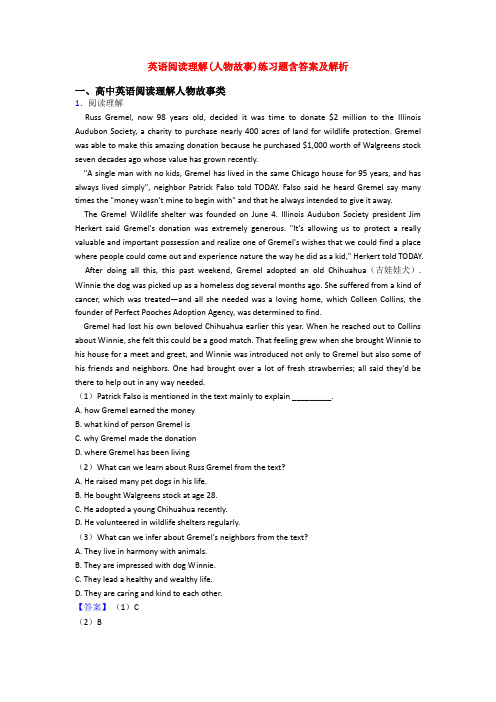
英语阅读理解(人物故事)练习题含答案及解析一、高中英语阅读理解人物故事类1.阅读理解Russ Gremel, now 98 years old, decided it was time to donate $2 million to the Illinois Audubon Society, a charity to purchase nearly 400 acres of land for wildlife protection. Gremel was able to make this amazing donation because he purchased $1,000 worth of Walgreens stock seven decades ago whose value has grown recently."A single man with no kids, Gremel has lived in the same Chicago house for 95 years, and has always lived simply", neighbor Patrick Falso told TODAY. Falso said he heard Gremel say many times the "money wasn't mine to begin with" and that he always intended to give it away.The Gremel Wildlife shelter was founded on June 4. Illinois Audubon Society president Jim Herkert said Gremel's donation was extremely generous. "It's allowing us to protect a really valuable and important possession and realize one of Gremel's wishes that we could find a place where people could come out and experience nature the way he did as a kid," Herkert told TODAY.After doing all this, this past weekend, Gremel adopted an old Chihuahua(吉娃娃犬). Winnie the dog was picked up as a homeless dog several months ago. She suffered from a kind of cancer, which was treated—and all she needed was a loving home, which Colleen Collins, the founder of Perfect Pooches Adoption Agency, was determined to find.Gremel had lost his own beloved Chihuahua earlier this year. When he reached out to Collins about Winnie, she felt this could be a good match. That feeling grew when she brought Winnie to his house for a meet and greet, and Winnie was introduced not only to Gremel but also some of his friends and neighbors. One had brought over a lot of fresh strawberries; all said they'd be there to help out in any way needed.(1)Patrick Falso is mentioned in the text mainly to explain _________.A. how Gremel earned the moneyB. what kind of person Gremel isC. why Gremel made the donationD. where Gremel has been living(2)What can we learn about Russ Gremel from the text?A. He raised many pet dogs in his life.B. He bought Walgreens stock at age 28.C. He adopted a young Chihuahua recently.D. He volunteered in wildlife shelters regularly.(3)What can we infer about Gremel's neighbors from the text?A. They live in harmony with animals.B. They are impressed with dog Winnie.C. They lead a healthy and wealthy life.D. They are caring and kind to each other.【答案】(1)C(2)B(3)D【解析】【分析】本文是一篇记叙文,格雷梅尔是一个没有孩子的单身男人,他在芝加哥同一所房子里住了95年,一直过着简朴的生活。
英语高中阅读理解(人物故事)练习题含解析
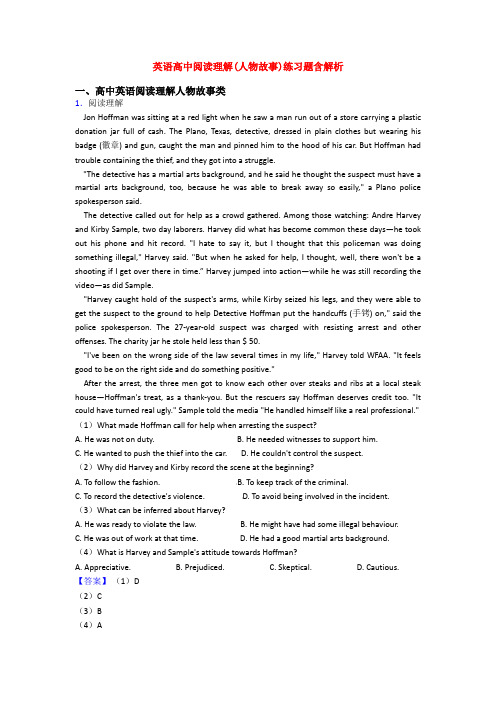
英语高中阅读理解(人物故事)练习题含解析一、高中英语阅读理解人物故事类1.阅读理解Jon Hoffman was sitting at a red light when he saw a man run out of a store carrying a plastic donation jar full of cash. The Plano, Texas, detective, dressed in plain clothes but wearing his badge (徽章) and gun, caught the man and pinned him to the hood of his car. But Hoffman had trouble containing the thief, and they got into a struggle."The detective has a martial arts background, and he said he thought the suspect must have a martial arts background, too, because he was able to break away so easily," a Plano police spokesperson said.The detective called out for help as a crowd gathered. Among those watching: Andre Harvey and Kirby Sample, two day laborers. Harvey did what has become common these days—he took out his phone and hit record. "I hate to say it, but I thought that this policeman was doing something illegal," Harvey said. "But when he asked for help, I thought, well, there won't be a shooting if I get over there in time.” Harvey jumped into action—while he was still recording the video—as did Sample."Harvey caught hold of the suspect's arms, while Kirby seized his legs, and they were able to get the suspect to the ground to help Detective Hoffman put the handcuffs (手铐) on," said the police spokesperson. The 27-year-old suspect was charged with resisting arrest and other offenses. The charity jar he stole held less than $ 50."I've been on the wrong side of the law several times in my life," Harvey told WFAA. "It feels good to be on the right side and do something positive."After the arrest, the three men got to know each other over steaks and ribs at a local steak house—Hoffman's treat, as a thank-you. But the rescuers say Hoffman deserves credit too. "It could have turned real ugly." Sample told the media "He handled himself like a real professional."(1)What made Hoffman call for help when arresting the suspect?A. He was not on duty.B. He needed witnesses to support him.C. He wanted to push the thief into the car.D. He couldn't control the suspect.(2)Why did Harvey and Kirby record the scene at the beginning?A. To follow the fashion.B. To keep track of the criminal.C. To record the detective's violence.D. To avoid being involved in the incident.(3)What can be inferred about Harvey?A. He was ready to violate the law.B. He might have had some illegal behaviour.C. He was out of work at that time.D. He had a good martial arts background.(4)What is Harvey and Sample's attitude towards Hoffman?A. Appreciative.B. Prejudiced.C. Skeptical.D. Cautious.【答案】(1)D(2)C(3)B(4)A【解析】【分析】本文是一篇记叙文,侦探Jon Hoffman在捉偷善款的小偷时遇到困难寻求帮助,Andre Harvey和 Kirby Sample帮助了他。
高中英语阅读理解(人物故事)的技巧及练习题及练习题(含答案)含解析
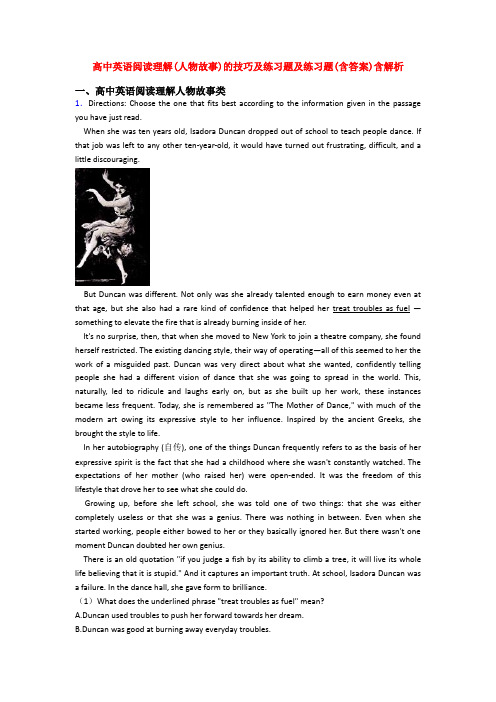
高中英语阅读理解(人物故事)的技巧及练习题及练习题(含答案)含解析一、高中英语阅读理解人物故事类1.Directions: Choose the one that fits best according to the information given in the passage you have just read.When she was ten years old, Isadora Duncan dropped out of school to teach people dance. If that job was left to any other ten-year-old, it would have turned out frustrating, difficult, and a little discouraging.But Duncan was different. Not only was she already talented enough to earn money even at that age, but she also had a rare kind of confidence that helped her treat troubles as fuel —something to elevate the fire that is already burning inside of her.It's no surprise, then, that when she moved to New York to join a theatre company, she found herself restricted. The existing dancing style, their way of operating—all of this seemed to her the work of a misguided past. Duncan was very direct about what she wanted, confidently telling people she had a different vision of dance that she was going to spread in the world. This, naturally, led to ridicule and laughs early on, but as she built up her work, these instances became less frequent. Today, she is remembered as "The Mother of Dance," with much of the modern art owing its expressive style to her influence. Inspired by the ancient Greeks, she brought the style to life.In her autobiography (自传), one of the things Duncan frequently refers to as the basis of her expressive spirit is the fact that she had a childhood where she wasn't constantly watched. The expectations of her mother (who raised her) were open-ended. It was the freedom of this lifestyle that drove her to see what she could do.Growing up, before she left school, she was told one of two things: that she was either completely useless or that she was a genius. There was nothing in between. Even when she started working, people either bowed to her or they basically ignored her. But there wasn't one moment Duncan doubted her own genius.There is an old quotation "if you judge a fish by its ability to climb a tree, it will live its whole life believing that it is stupid." And it captures an important truth. At school, Isadora Duncan was a failure. In the dance hall, she gave form to brilliance.(1)What does the underlined phrase "treat troubles as fuel" mean?A.Duncan used troubles to push her forward towards her dream.B.Duncan was good at burning away everyday troubles.C.Troubles turned Duncan into a confident girl.D.Troubles lit the fire of dancing in Duncan.(2)Which of the following is TRUE about Duncan?A.Her experience in New York was the foundation of her career.B.Her teaching job when she was little destroyed her confidence.C.Her dancing style was not very well received at the beginning.D.Her mother set higher expectation on her than she could bear.(3)What does the author try to tell the readers in the last paragraph?A.It is useless climbing a tree to catch fish.B.Everybody is a genius in his own way.C.Miseries come from human stupidity.D.Teachers can impact students greatly.(4)What is this passage mainly about?A.Isadora Duncan's childhood and her achievements today.B.Duncan's career development and other dancers' opinions of her.C.Isadora Duncan's early experiences and the reasons for her success.D.Duncan's high status in the dancing world and her unique expressive style.【答案】(1)A(2)C(3)B(4)C【解析】【分析】本文是一篇记叙文,伊莎多拉·邓肯十岁时辍学去教别人跳舞,作者讲述了她的早期的经历以及其取得成功的原因。
【英语】 英语阅读理解(人物故事)专题练习(及答案)含解析
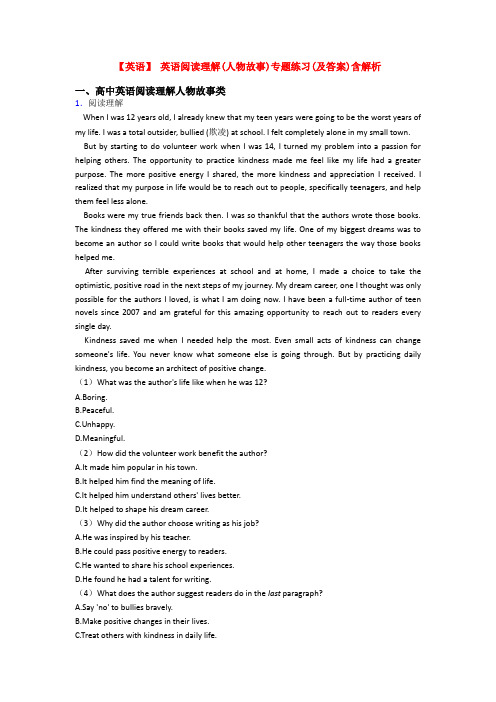
【英语】英语阅读理解(人物故事)专题练习(及答案)含解析一、高中英语阅读理解人物故事类1.阅读理解When I was 12 years old, I already knew that my teen years were going to be the worst years of my life. I was a total outsider, bullied (欺凌) at school. I felt completely alone in my small town.But by starting to do volunteer work when I was 14, I turned my problem into a passion for helping others. The opportunity to practice kindness made me feel like my life had a greater purpose. The more positive energy I shared, the more kindness and appreciation I received. I realized that my purpose in life would be to reach out to people, specifically teenagers, and help them feel less alone.Books were my true friends back then. I was so thankful that the authors wrote those books. The kindness they offered me with their books saved my life. One of my biggest dreams was to become an author so I could write books that would help other teenagers the way those books helped me.After surviving terrible experiences at school and at home, I made a choice to take the optimistic, positive road in the next steps of my journey. My dream career, one I thought was only possible for the authors I loved, is what I am doing now. I have been a full-time author of teen novels since 2007 and am grateful for this amazing opportunity to reach out to readers every single day.Kindness saved me when I needed help the most. Even small acts of kindness can change someone's life. You never know what someone else is going through. But by practicing daily kindness, you become an architect of positive change.(1)What was the author's life like when he was 12?A.Boring.B.Peaceful.C.Unhappy.D.Meaningful.(2)How did the volunteer work benefit the author?A.It made him popular in his town.B.It helped him find the meaning of life.C.It helped him understand others' lives better.D.It helped to shape his dream career.(3)Why did the author choose writing as his job?A.He was inspired by his teacher.B.He could pass positive energy to readers.C.He wanted to share his school experiences.D.He found he had a talent for writing.(4)What does the author suggest readers do in the last paragraph?A.Say 'no' to bullies bravely.B.Make positive changes in their lives.C.Treat others with kindness in daily life.D.Learn to care more about others' feelings.【答案】(1)C(2)B(3)B(4)C【解析】【分析】本文是一篇记叙文,作者讲述了自己参加志愿活动的经历,告诉人们:一次小善举也可能改变一个人的一生。
高考英语阅读理解(人物故事)练习题及答案
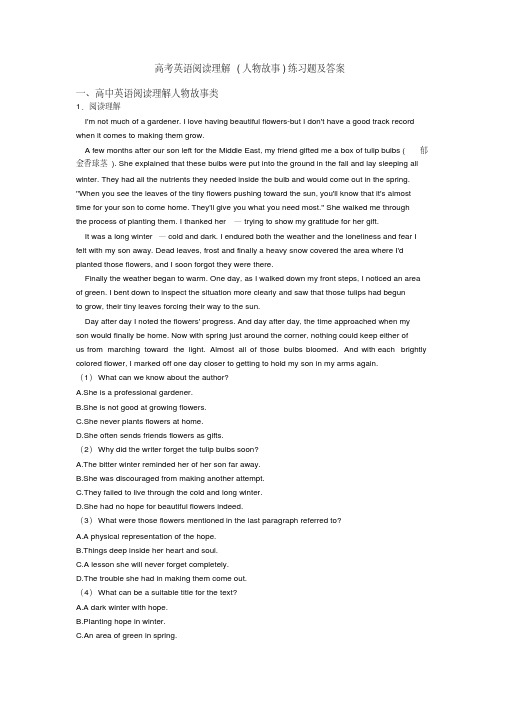
高考英语阅读理解(人物故事)练习题及答案一、高中英语阅读理解人物故事类1.阅读理解I'm not much of a gardener. I love having beautiful flowers-but I don't have a good track record when it comes to making them grow.A few months after our son left for the Middle East, my friend gifted me a box of tulip bulbs (郁金香球茎). She explained that these bulbs were put into the ground in the fall and lay sleeping all winter. They had all the nutrients they needed inside the bulb and would come out in the spring.''When you see the leaves of the tiny flowers pushing toward the sun, you'll know that it's almost time for your son to come home. They'll give you what you need most.'' She walked me throughthe process of planting them. I thanked her — trying to show my gratitude for her gift.It was a long winter — cold and dark. I endured both the weather and the loneliness and fear I felt with my son away. Dead leaves, frost and finally a heavy snow covered the area where I'd planted those flowers, and I soon forgot they were there.Finally the weather began to warm. One day, as I walked down my front steps, I noticed an area of green. I bent down to inspect the situation more clearly and saw that those tulips had begunto grow, their tiny leaves forcing their way to the sun.Day after day I noted the flowers' progress. And day after day, the time approached when myson would finally be home. Now with spring just around the corner, nothing could keep either ofus from marching toward the light. Almost all of those bulbs bloomed. And with each brightly colored flower, I marked off one day closer to getting to hold my son in my arms again.(1)What can we know about the author?A.She is a professional gardener.B.She is not good at growing flowers.C.She never plants flowers at home.D.She often sends friends flowers as gifts.(2)Why did the writer forget the tulip bulbs soon?A.The bitter winter reminded her of her son far away.B.She was discouraged from making another attempt.C.They failed to live through the cold and long winter.D.She had no hope for beautiful flowers indeed.(3)What were those flowers mentioned in the last paragraph referred to?A.A physical representation of the hope.B.Things deep inside her heart and soul.C.A lesson she will never forget completely.D.The trouble she had in making them come out.(4)What can be a suitable title for the text?A.A dark winter with hope.B.Planting hope in winter.C.An area of green in spring.D.Living a changeable life.【答案】(1)B(2)D(3)A(4)B【解析】【分析】本文是一篇记叙文,作者的儿子去了中东,作者感到孤独和寂寞。
英语阅读理解(人物故事)练习题20篇及解析
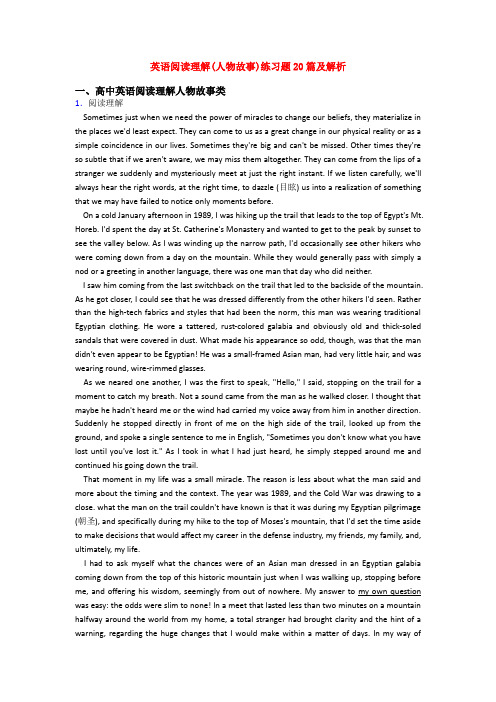
英语阅读理解(人物故事)练习题20篇及解析一、高中英语阅读理解人物故事类1.阅读理解Sometimes just when we need the power of miracles to change our beliefs, they materialize in the places we'd least expect. They can come to us as a great change in our physical reality or as a simple coincidence in our lives. Sometimes they're big and can't be missed. Other times they're so subtle that if we aren't aware, we may miss them altogether. They can come from the lips of a stranger we suddenly and mysteriously meet at just the right instant. If we listen carefully, we'll always hear the right words, at the right time, to dazzle (目眩) us into a realization of something that we may have failed to notice only moments before.On a cold January afternoon in 1989, I was hiking up the trail that leads to the top of Egypt's Mt. Horeb. I'd spent the day at St. Catherine's Monastery and wanted to get to the peak by sunset to see the valley below. As I was winding up the narrow path, I'd occasionally see other hikers who were coming down from a day on the mountain. While they would generally pass with simply a nod or a greeting in another language, there was one man that day who did neither.I saw him coming from the last switchback on the trail that led to the backside of the mountain. As he got closer, I could see that he was dressed differently from the other hikers I'd seen. Rather than the high-tech fabrics and styles that had been the norm, this man was wearing traditional Egyptian clothing. He wore a tattered, rust-colored galabia and obviously old and thick-soled sandals that were covered in dust. What made his appearance so odd, though, was that the man didn't even appear to be Egyptian! He was a small-framed Asian man, had very little hair, and was wearing round, wire-rimmed glasses.As we neared one another, I was the first to speak, "Hello," I said, stopping on the trail for a moment to catch my breath. Not a sound came from the man as he walked closer. I thought that maybe he hadn't heard me or the wind had carried my voice away from him in another direction. Suddenly he stopped directly in front of me on the high side of the trail, looked up from the ground, and spoke a single sentence to me in English, "Sometimes you don't know what you have lost until you've lost it." As I took in what I had just heard, he simply stepped around me and continued his going down the trail.That moment in my life was a small miracle. The reason is less about what the man said and more about the timing and the context. The year was 1989, and the Cold War was drawing to a close. what the man on the trail couldn't have known is that it was during my Egyptian pilgrimage (朝圣), and specifically during my hike to the top of Moses's mountain, that I'd set the time aside to make decisions that would affect my career in the defense industry, my friends, my family, and, ultimately, my life.I had to ask myself what the chances were of an Asian man dressed in an Egyptian galabia coming down from the top of this historic mountain just when I was walking up, stopping before me, and offering his wisdom, seemingly from out of nowhere. My answer to my own question was easy: the odds were slim to none! In a meet that lasted less than two minutes on a mountain halfway around the world from my home, a total stranger had brought clarity and the hint of a warning, regarding the huge changes that I would make within a matter of days. In my way ofthinking, that's a miracle.I suspect that we all experience small miracles in our lives every day. Sometimes we have the wisdom and the courage to recognize them for what they are In the moments when we don't,that's okay as well. It seems that our miracles have a way of coming back to us again and again.And each time they do, they become a little less subtle, until we can't possibly miss the messagethat they bring to our lives!The key is that they're everywhere and occur every day for different reasons, in response to the different needs that we may have in the moment. Our job may be less about questioning the extraordinary things that happen in our daily lives and more about accepting the gifts they bring.(1)Why did the author make a pilgrimage to Mt Horeb in Egypt?A. He was in search of a miracle in his life.B. It was a holy place for a religious person to head for.C. He intended to make arrangements for his life in the future.D. He waited patiently in expectation of meeting a wise person.(2)What does the underlined part "my own question" refer to in paragraph 6?A. For what reason did the man stop before me?B. Why did the Asian man go to the mountain?C. What change would I make within a matter of days?D. What was the probability that others told us the right words?(3)Which of the following is closest in meaning to the underlined word "subtle" in paragraph 7?A. Apparent.B. Delicate.C. Precise.D. Sufficient.(4)The author viewed the meet with the Asian man as a miracle in his life in that ________.A. the Asian man's appearance had a deciding effect on his future lifeB. his words were in perfect response to the need he had at that momentC. what the Asian man said was abundant in the philosophy of lifeD. the Asian man impressed on him the worth of what he had possessed(5)What might be the best title for the passage?A. Can you recognize a miracle?B. Is a miracle significant to us?C. When might a miracle occur?D. Why do we need a miracle?(6)After the encounter of the Asian man, what will the writer probably do immediately?A. Continue walking up to the top of the mountain.B. Have a rest to refresh himself.C. Try to have a heart-to-heart conversation with the Asian man.D. Come down the mountain.【答案】(1)C(2)D(3)B(4)B(5)A(6)D【解析】【分析】本文是一篇记叙文,作者讲述了一次埃及朝圣时,爬到何烈山半山腰时,偶遇了一位正在下山的亚洲陌生人。
(英语)高三英语阅读理解(人物故事)的技巧及练习题及练习题(含答案)
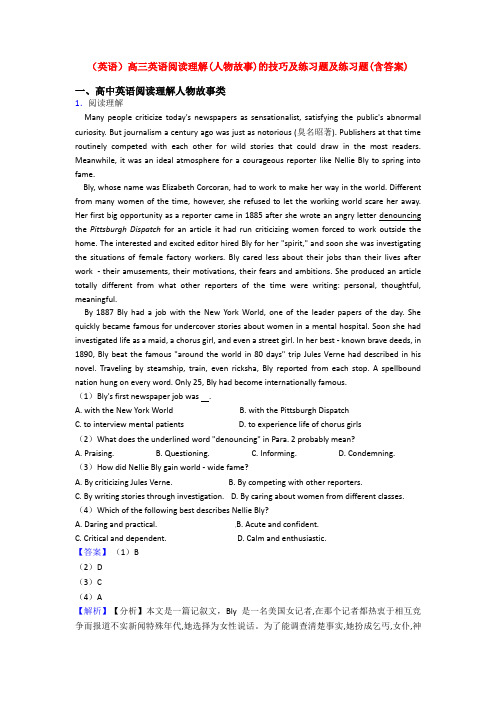
(英语)高三英语阅读理解(人物故事)的技巧及练习题及练习题(含答案)一、高中英语阅读理解人物故事类1.阅读理解Many people criticize today's newspapers as sensationalist, satisfying the public's abnormal curiosity. But journalism a century ago was just as notorious (臭名昭著). Publishers at that time routinely competed with each other for wild stories that could draw in the most readers. Meanwhile, it was an ideal atmosphere for a courageous reporter like Nellie Bly to spring into fame.Bly, whose name was Elizabeth Corcoran, had to work to make her way in the world. Different from many women of the time, however, she refused to let the working world scare her away. Her first big opportunity as a reporter came in 1885 after she wrote an angry letter denouncing the Pittsburgh Dispatch for an article it had run criticizing women forced to work outside the home. The interested and excited editor hired Bly for her "spirit," and soon she was investigating the situations of female factory workers. Bly cared less about their jobs than their lives after work - their amusements, their motivations, their fears and ambitions. She produced an article totally different from what other reporters of the time were writing: personal, thoughtful, meaningful.By 1887 Bly had a job with the New York World, one of the leader papers of the day. She quickly became famous for undercover stories about women in a mental hospital. Soon she had investigated life as a maid, a chorus girl, and even a street girl. In her best - known brave deeds, in 1890, Bly beat the famous "around the world in 80 days" trip Jules Verne had described in his novel. Traveling by steamship, train, even ricksha, Bly reported from each stop. A spellbound nation hung on every word. Only 25, Bly had become internationally famous.(1)Bly's first newspaper job was .A. with the New York WorldB. with the Pittsburgh DispatchC. to interview mental patientsD. to experience life of chorus girls(2)What does the underlined word "denouncing" in Para. 2 probably mean?A. Praising.B. Questioning.C. Informing.D. Condemning.(3)How did Nellie Bly gain world - wide fame?A. By criticizing Jules Verne.B. By competing with other reporters.C. By writing stories through investigation.D. By caring about women from different classes.(4)Which of the following best describes Nellie Bly?A. Daring and practical.B. Acute and confident.C. Critical and dependent.D. Calm and enthusiastic.【答案】(1)B(2)D(3)C(4)A【解析】【分析】本文是一篇记叙文,Bly是一名美国女记者,在那个记者都热衷于相互竞争而报道不实新闻特殊年代,她选择为女性说话。
2015年高考英语真题_人物传记、故事类
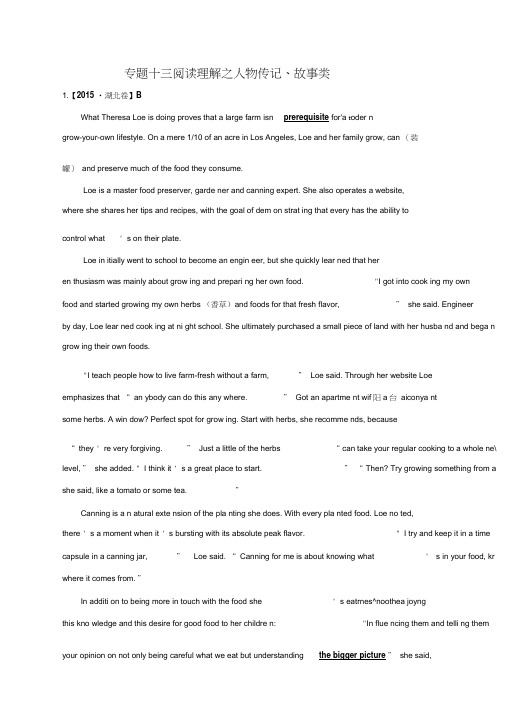
专题十三阅读理解之人物传记、故事类1.【2015 •湖北卷】BWhat Theresa Loe is doing proves that a large farm isn prerequisite for'a t oder ngrow-your-own lifestyle. On a mere 1/10 of an acre in Los Angeles, Loe and her family grow, can (装罐)and preserve much of the food they consume.Loe is a master food preserver, garde ner and canning expert. She also operates a website,where she shares her tips and recipes, with the goal of dem on strat ing that every has the ability tocontrol what ' s on their plate.Loe in itially went to school to become an engin eer, but she quickly lear ned that heren thusiasm was mainly about grow ing and prepari ng her own food. "I got into cook ing my ownfood and started growing my own herbs (香草)and foods for that fresh flavor, ” she said. Engineerby day, Loe lear ned cook ing at ni ght school. She ultimately purchased a small piece of land with her husba nd and bega n grow ing their own foods."I teach people how to live farm-fresh without a farm, ” Loe said. Through her website Loeemphasizes that “ an ybody can do this any where. ” Got an apartme nt wif阳a台aiconya ntsome herbs. A win dow? Perfect spot for grow ing. Start with herbs, she recomme nds, because“ they ' re very forgiving. ” Just a little of the herbs “ can take your regular cooking to a whole ne\ level, ” she added. " I think it ' s a great place to start. ” “ Then? Try growing something from a she said, like a tomato or some tea. ”Canning is a n atural exte nsion of the pla nting she does. With every pla nted food. Loe no ted,there ' s a moment when it ' s bursting with its absolute peak flavor. " I try and keep it in a time capsule in a canning jar, ”Loe said. “ Canning for me is about knowing what ' s in your food, kr where it comes from. ”In additi on to being more in touch with the food she ' s eatrnes^noothea joyngthis kno wledge and this desire for good food to her childre n: "In flue ncing them and telli ng them your opinion on not only being careful what we eat but understanding the bigger picture ” she said,"that if we don ' t take care of theneawthl..” 55. The underlined word ________________________________ " prerequisite ” (Pare. 1) isclosest in meaning to " ” .56. Why does Loe suggest start ing with herbs?A. They are used daily.B. They are easy to grow.C. They can grow very tallD. They can be eate n un cooked57. Accord ing to Loe, what is the ben efit of canning her pla nted foods?A. It can preserve their best flavorB. It can promote her on li ne salesC. It can better her cook ing skillsD. It can improve their nu triti on58. What is the “ the bigger picture ” (Para. 6) that Loe wishes her children to understand?A. The kno wledge about good foodB. The way to live a grow-our-ow n lifeC. The joy of gett ing in touch with foodsD. The resp on sibility to protect our earth【解折】试題分析:本文是一篇记叙文。
- 1、下载文档前请自行甄别文档内容的完整性,平台不提供额外的编辑、内容补充、找答案等附加服务。
- 2、"仅部分预览"的文档,不可在线预览部分如存在完整性等问题,可反馈申请退款(可完整预览的文档不适用该条件!)。
- 3、如文档侵犯您的权益,请联系客服反馈,我们会尽快为您处理(人工客服工作时间:9:00-18:30)。
第三部分名人故事(五)21. Albert Einstein, a Great Scientific Thinker艾伯特•爱因斯坦—伟大的科学思想家艾伯特•爱因斯坦,举世闻名的德裔美国科学家,现代物理学的开创者和奠基人。
爱因斯坦的狭义相对论成功地揭示了能量与质量之间的关系,解决了长期存在的恒星能源来源的难题。
近年来发现越来越多的高能物理现象,狭义相对论已成为解释这种现象的一种最基本的理论工具。
其广义相对论也解决了一个天文学上多年的不解之谜,并推断出后来被验证了s的光线弯曲现象,还成为后来许多天文概念的理论基础。
大大推动了现代天文学的发展。
Albert Einstein (1879-1955) was one of the greatest and most original scientific thinkers of all time.Born of Jewish parents at Ulm in Germany, he completed his education in Switzerland and got his Ph. D. at the University of Zurich. He went to live in the United States in 1933 because of the rise of Nazism in Germany and Hitler’s persecution of the Jews.In 1905, while still at Zurich, he published his Special Theory of Relativity, which was based on things everyone may have noticed. If two trains are standing alongside each other and one train starts to move, a person sitting in the train may wonder whether his own train is moving or the other is moving, and before he finds out what is happening, he can see that one train is moving relative to the other. From this and also from other more complicated facts, Einstein came to the conclusion that all motion is relative and that there is really no such thing as absolute motion. Some of the other conclusions he drew are that nothing can go faster than light, and that if something such as a ruler was moving faster and faster it would seem to get shorter and shorter as its speed was near the speed of light. By 1915, Einstein had made known his General Theory of Relativity. He also improved on Newton’s theory of gravity. Most o f his theories have been tested and found to be true though some may sound strange. For his important work he was awarded the 1921 Nobel Prize for Physics.Towards the end of his life, Einstein was asked by a group of students to explain his complicated Theory of Relativity. He said, “When you sit with a pretty girl for an hour, it seems like a minute; but when you sit on a hot stove for a minute, it seems like an hour. That is relativity.”Comprehension Questions:C. still in Switzerland at the age of twenty-six.D. still at the University of Zurich at the age of thirty-six.3. One of the conclusions drawn by Einstein is that ______A. planes can go faster than trains and buses.B. people couldn't run as fast as vehicles.C. light goes the fastest of all things.D. two trains can never go at the same time.4. Einstein added that if something such as a ruler was moving, it would seem to get shorter and shorter ______A. because the ruler itself was short.B. when it was moving faster and faster.C. because we can't see it clearly.D. because the ruler was broken into pieces.5. Albert Einstein was world-famous for his ______A. Special Theory of Relativity.B. General Theory of Relativity.C. improving on Newton’s theory of gravity.D. all his work mentioned above.(DCCBD)22. Madame Curie, the First Winner of Two Nobel Prizes居里夫人—第一位两次诺贝尔奖获得者居里夫人,波兰裔法国籍女物理学家、放射化学家。
一位影响过世界进程、伟大无私而又谦逊质朴的女性;在科学探索中坚毅刻苦、锲而不舍并取得卓越非凡功绩的人;第一位两次诺贝尔奖获得者;原子能时代的开创者之一。
1903年和丈夫皮埃尔·居里及亨利·贝克勒尔共同获得了诺贝尔物理学奖,1911年又因放射化学方面的成就获得诺贝尔化学奖。
with another scientist, metallic radium. For this she received the 1911 Nobel Prize for Chemistry. So she was the first to get a second Nobel Prize. Comprehension Questions:1. Which of the following statements is not true according to the passage? ______A. Madame Curie was a chemist and physicist.B. Warsaw is the capital of Poland.C. It was Marie’s father who had her interested in science.D. Marie Curie and Pierre Curie studied at the Sorbonne.2. According to Marie Curie’s report in 1898, ______A. there was a new powerful radioactive element existing in some metal.B. the two elements polonium and radium existed in pitchblende ores.C. some new powerful radioactive elements might exist in pitchblende ores.D. she had found out the nature of uranium.3. The 1930 Nobel Prize for Physics was given to ______A. Madams Curie.B. Pierre Curie.C. the Curies.D. the Curies and Becquerel.4. After husb and’s death, Madame Curie ______A. succeeded in becoming a professor of physics at Sorbonne.B. took his place and became a professor of physics at the Sorbonne.C. was a successful professor of physics at the Sorbonne.D. was successful as a professor of chemistry at the Sorbonne.5. Madame Curie was the first to ______A. get a second Nobel Prize for Chemistry.B. win the Nobel Prize as a woman.C. win a second Nobel Prize.D. discover radioactivity.(DCDBC)23. Abraham Lincoln, the 16th American President亚伯拉罕•林肯—美国第16任总统already left the Union; four more states would soon follow them. The start of the Civil War was only weeks away.Many people doubted Lincoln's ability to pull the Union together. He was then just a country lawyer. He had only a few years of schooling, and he had served one term in Congress. His only real fame came from a serious of debates over slavery. Lincoln's firm stand against slavery helped him win the Republican nomination for president.Lincoln did keep the Union together by the only way possible---winning the war. He slowly built the North's army into a powerful fighting force. By such acts as freeing the slaves, Lincoln won wide support.In 1865, he began his second term. He hoped to bring the South back into the Union without bitterness on either side. Six weeks later, he was murdered, his great task still unfinished.The following is detailed information about Lincoln’s death.On April 14th, after a very busy day, the President and his wife went to see the performance of a play at Ford’s Theater in Washington.In an inn near the theater was a 25-year-old unsuccessful actor named John Wilkes Booth. He was a supporter of the defeated South. As the play was going to start again after the interval, Booth entered the theater and walked slowly towards the President’s box and opened the door. The sound of a shot broke in and Booth leaped from the box onto the stage and hurried out through an exit door. Smoke was seen coming from the President’s box and the theater was filled with shouting, madly excited people. Soldiers hurried in to clear the building, and Lincoln, shot through the head, was carried unconscious to a house across the road from the theater, and laid on the bed. He never recovered consciousness and died next morning. Comprehension Questions:1. From the passage we know that James Buchanan was probably ______A. Lincoln's political enemy.B. one of Lincoln's neighbors.C. the 15th American President.D. a minister of the White House.4. Lincoln's firm stand against slavery ______A. made it possible for him to be elected President.B. made the Southern slave owners give up theirs.C. provided him with a chance to win the war.D. helped build up an army of his own.5. Lincoln's leading achievement as President was that ______A. he worked for the people heart and soul.B. he was firmly against slavery.C. he reunited the nation and did away with slavery.D. he was a warm-hearted and honest man.(CBBAC)24. Beethoven And His Moonlight Sonata贝多芬和他的《月光鸣奏曲》路德维希•凡•贝多芬(1770-1827),德国最伟大的音乐家之一。
